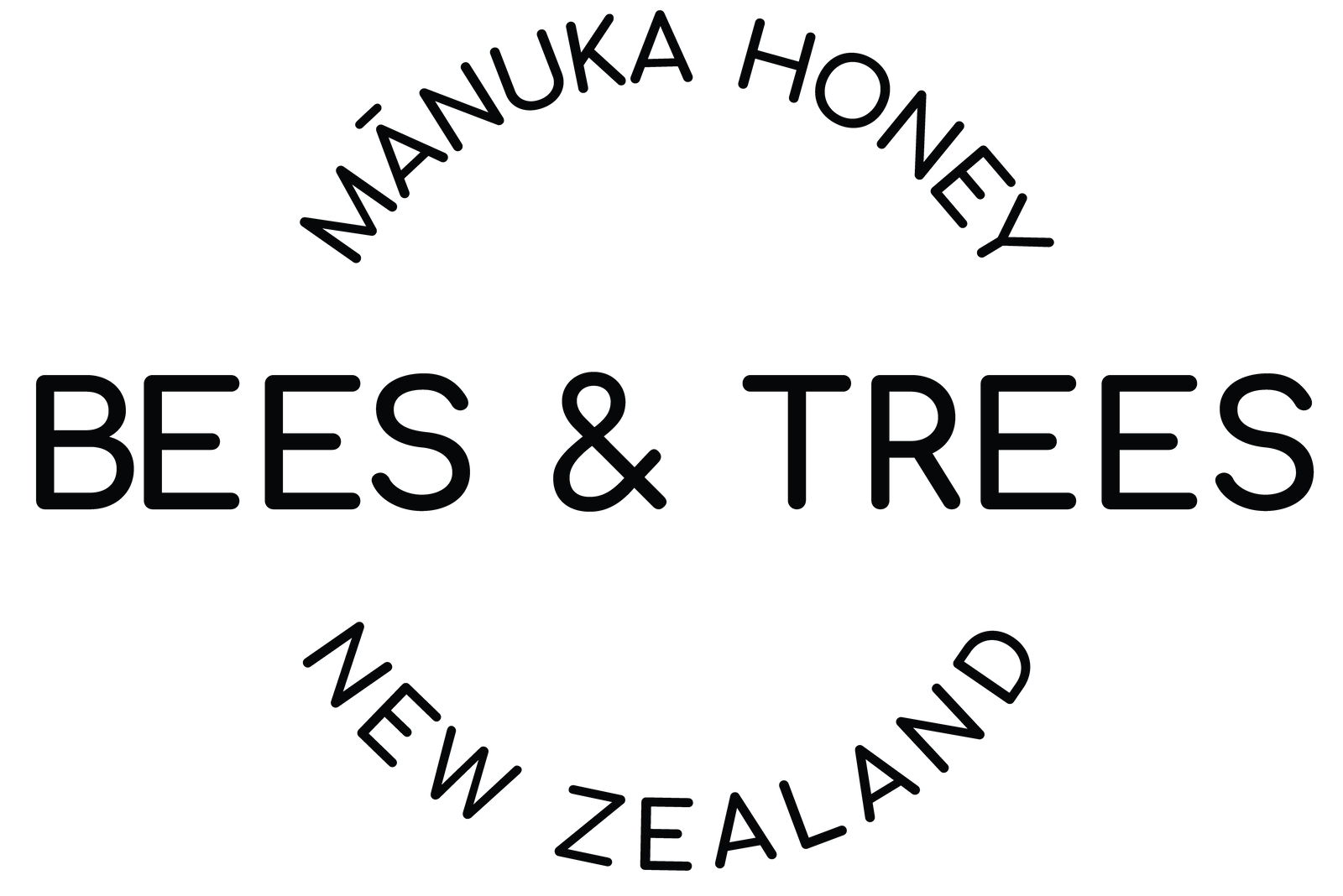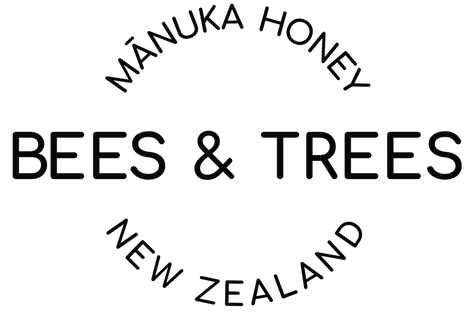
Manuka honey can be a close friend and play a vital role in your skin’s overall health and beauty regime. Whether it’s reducing symptoms of skin irritation, treating acne, healing wounds, or delivering a healthy daily boost of hydration to your skin, Manuka honey has got you covered, literally!
In this article, we’ll cover why Manuka honey works so well with our skin, and common skin conditions that can be treated with Manuka honey.
Why is Manuka Honey Good for your Skin?

Honey has actually been used for centuries to dress wounds and provide skin care, dating all the way back to the ancient Egyptians and Greeks. What makes Manuka honey especially effective in various skin treatments is its high amount of Methylglyoxal (MGO). MGO is a naturally occurring organic compound that gives Manuka honey its unique and powerful antimicrobial and antibacterial properties. These properties help reduce inflammation, kill harmful bacteria, retain moisture, and provide a myriad of other benefits for your skin and body, both inside and out.
In ensuring the highest quality for skincare applications, New Zealand's honey quality standards play a crucial role. Manuka honey, renowned for its potent and broad spectrum of antibacterial, antiviral, antioxidant, anti-inflammatory, and antiparasitic properties, is subject to these rigorous standards. This ensures that the Manuka honey used in our skincare products is not only effective but also safe and of the highest purity.
Top 5 Manuka Honey Benefits for Skin
1. Manuka Honey for Acne

Manuka honey’s profound antibacterial and anti-inflammatory properties make it resourceful when dealing with skin blemishes and acne outbreaks. Acne is often caused by bacteria penetrating the skin and creating small pockets of infections. It’s a common occurrence for many people and the severity of acne outbreaks can vary depending on each individual.
Utilizing Manuka honey in your current skin care regimen can potentially be very helpful. Known effects from applying Manuka honey to the skin include:
-
Decrease in bad bacteria that infect pores and cause infections
-
Retention of moisture and great emollient properties, softening the skin.
-
Anti-inflammatory properties that reduce inflammation caused by acne breakouts
-
Balancing of the skin’s pH level, keeping bacteria at bay
-
Fighting microbial infections that cause acne without irritating your skin
-
Gentle removal of impurities like excess oil and acne-causing bacteria from the pores, without further clogging pores.
How to Use Manuka Honey on Acne:
After cleaning your face with a gentle cleanser, apply Manuka honey to your clean face and neck and keep it on for 10-20 minutes. Rinse off with warm water and gently pat dry with a soft hand towel. Then follow with an oil-free moisturizer if you’d like. This process is gentle on the skin but effective in fighting acne. Manuka honey is very safe to use, but be careful with your clothing – honey is sticky! For spot treatment, you can also dab a smidge on a pimple or blemish and cover with a bandage.
The strong antibacterial and antimicrobial properties of Manuka honey make it effective in killing bacterial strains that can initially cause acne.
2. Manuka Honey for Dry Skin

Manuka honey also is well known for its ability to moisturize and nourish dry skin. In an interview with a beauty blog called Byrdie, Dr. Claire Chang, a board-certified dermatologist at Union Square Laser Dermatology in New York City, gave the inside scoop as to why Manuka honey is so effective when dealing with dry skin:
“Manuka honey is a natural humectant due to its sugar component, meaning it helps draw in and retain moisture in the skin," says Dr. Chang.
The all-natural ingredients and potent antimicrobial properties help rejuvenate and moisturize skin. Its antioxidant properties help to slow down the aging process by regulating skin-damaging reactive oxygen species.
In total, the natural benefits of Manuka honey work to hydrate and protect the skin from dryness and aging. This explains why Manuka honey is used as a key ingredient in a myriad of different skincare products. Its incredible ability to nourish and support healthy skin is a must for anyone dealing with dry skin, acne, or rashing issues.
How to Apply Manuka Honey on Dry Skin
1. Use MG 350+ or higher Manuka honey
2. Take 1 tbsp of Manuka Honey
3. You can dilute the honey with equal parts water to expand the amount of surface area you can rub it on
4. Let sit for 20-30 minutes
5. Rinse off with warm water and gently pat dry with a soft hand towel
6. Follow with an oil-free moisturizer if you’d like
7. Repeat (2x a day/daily) for best results
3. Manuka Honey for Wound Care and Burns
As previously mentioned, honey has been used for thousands of years as a therapeutic treatment for various wounds and other ailments. The Ancient Greeks would utilize bandages covered in honey to dress wounds from battle; soldiers benefited greatly from the honey’s natural antibacterial and anti-inflammatory properties.
Hippocrates, known as the father of modern medicine, speaks about the healing virtues of honey, observing that it “….cleans sores and ulcers, softens hard ulcers of the lips, heals carbuncles and running sores.”
Thanks to a couple of thousand years of medical advancements, scientists have been able to dive deeper into the incredible healing properties of Manuka honey and its sophisticated use in natural wellness and medicine healthy practices. Research has shown that Manuka honey can play a powerful role in the body’s natural ability to regenerate damaged tissue.
Alongside its strong antibacterial properties, Manuka honey is a great solution for protecting wounds and burns from possible future infections. Applying Manuka honey to scrapes, cuts, burns or other wounds is simple, easy to do, and comes with great benefits.
When using Manuka honey to treat burns and wounds effectively, we recommend using a high MGO honey (at least 550+ MGO) for greater antibacterial properties.
How to Apply Manuka Honey on Wounds and Burns
1. First, dry the wound area so there is no moisture around it
2. Smear an even layer of manuka honey inside and around the wounded area
3. Dress the wound with a water-resistant and airtight bandage or gauze (aka occlusive dressing)
4. Let the wound rest and heal - be sure to replace the dressing at least once a day so it doesn’t become overly saturated.
4. Manuka Honey for Rashes

Manuka honey’s anti-inflammatory and antibacterial properties make it a great option for managing many skin conditions. Rashes caused by skin allergies can be easier managed when utilizing Manuka honey’s powerhouse of nourishing skin care properties.
Another interesting way Manuka honey helps to manage symptoms of rashes is through its immune-boosting abilities. As Manuka honey boosts our overall immune system, it, in turn, reduces our susceptibility to skin allergies and infections that can lead to rashes.
Research conducted shows that Manuka honey stimulates immune cells and the production of Cytokines. Cytokines are protein messengers that, in essence, help to recode our immune system, making it stronger and more resistant to rash and eczema-causing allergies.
Consuming Manuka honey regularly is one of the easiest ways to aid in building a stronger immune system. For immediate treatment of rashes and eczema, Manuka honey’s strong anti-inflammatory properties make it a great choice to relieve and reduce symptoms while also nourishing the skin’s natural healing properties.
How to Apply Manuka Honey for Rashes
1. Take a high-grade Manuka honey (550+ MGO) and spread evenly over the affected area
2. Let the honey rest there for at least 20 minutes
3. Rinse off with warm water and gently pat dry with a soft hand towel
4. Repeat every day - Depending on the severity, repeat 2-3 times a day
5. Manuka Honey for Skin Pigmentation
Skin pigmentation issues, such as dark spots and uneven skin tones, can be the result of various factors including sun exposure, hormonal changes, and even inflammation. These pigmentation changes can be challenging to address, affecting one's complexion and confidence.
Manuka honey, known for its remarkable healing properties, emerges as a natural ally against skin pigmentation. Its anti-inflammatory qualities help reduce the redness and inflammation that can lead to post-inflammatory hyperpigmentation, especially after acne outbreaks. Furthermore, Manuka honey's potent antioxidant properties aid in repairing and rejuvenating the skin, promoting a more even skin tone and reducing the visibility of dark spots.
How to Apply Manuka Honey for Skin Pigmentation
Apply a thin layer of Manuka honey directly to the affected areas of your skin and leave it on for 10-20 minutes before rinsing off with lukewarm water. For best results, incorporate this into your daily skincare routine, either in the morning or evening.
Consistent use can help diminish the appearance of dark spots and even out your skin tone, leveraging the skin benefits of Manuka honey for a more radiant complexion.
Conclusion

Manuka honey’s naturally occurring properties make it a truly unique and effective treatment for many different skin care needs. Its antibacterial properties help it to penetrate the skin and kill acne-causing bacteria. Its natural sugars work to hydrate, moisturize and soften the skin. Wounds and burns can be treated with Manuka honey’s strong anti-inflammatory and cleansing properties.
Manuka honey is one of nature’s most impressive foods that houses numerous amazing benefits for our skin and body, both inside and out!
We also suggest eating Manuka honey to promote intestinal wellness, which will help your body’s natural balance of good and bad bacteria. We recommend a teaspoon a day for wellness.
Try the World’s BEST Manuka Honey
Our delicious, fresh, and all-natural Manuka honey goes straight from the hive to the glass jar and to your home! Bees and Trees Manuka honey is raw and minimally processed.
Frequently Asked Questions
1. Is Manuka honey good for your skin?
Yes, Manuka honey is excellent for your skin. The health benefits of Manuka honey on skin include its ability to reduce inflammation, fight acne-causing bacteria, and retain moisture, making it a versatile and powerful ingredient in skincare. Its unique antibacterial and antioxidant properties help promote a clearer, more radiant complexion while also soothing and repairing damaged skin. Whether used as a cleanser, mask, or spot treatment, Manuka honey can enhance your skin's overall health and appearance.
2. Is Manuka honey good for your face?
If you're wondering, ‘Can you use Manuka honey on your face?’ the answer is absolutely yes. There are many benefits of Manuka honey on face health. Its unique antibacterial, anti-inflammatory, and moisturizing properties make it a natural and effective skincare choice. Applying Manuka honey as a face mask or cleanser can help reduce acne, soothe inflammation, and hydrate the skin, leaving it glowing and healthy.
3. Can you use Manuka honey on your face every day?
Yes, you can use Manuka honey on your face every day. Its gentle yet effective properties make it suitable for daily use, helping to moisturize, soothe, and enhance your skin's natural glow without causing irritation. Regular application leverages the full extent of Manuka honey's skin benefits, promoting a healthier, more radiant complexion.
4. Does Manuka honey skincare work for all skin types?
Yes, Manuka honey skincare works well for most skin types due to its natural, gentle properties. The wide range of Manuka honey uses for skin, including its antibacterial, anti-inflammatory, and moisturizing qualities, make it a versatile addition to any skincare routine. Regardless of whether you have oily, dry, sensitive, or combination skin, you can benefit from the Manuka honey skin benefits. However, like with any natural product, it's important to patch test before full application, especially if you have sensitive skin or allergies.
References
Niaz K, Maqbool F, Bahadar H, Abdollahi M. Health Benefits of Manuka Honey as an Essential Constituent for Tissue Regeneration. Curr Drug Metab. 2017;18(10):881-892. doi: 10.2174/1389200218666170911152240. PMID: 28901255.
Rud, Melanie. “Dermatologists Say Manuka Honey Is a Powerful Force Against Acne.” Byrdie, 27 Jan. 2020, www.byrdie.com/manuka-honey-for-skin-4776793#citation-3.
Tonks AJ, Dudley E, Porter NG, Parton J, Brazier J, Smith EL, Tonks A. A 5.8-kDa component of manuka honey stimulates immune cells via TLR4. J Leukoc Biol. 2007 Nov;82(5):1147-55. doi: 10.1189/jlb.1106683. Epub 2007 Aug 3. PMID: 17675558.
Tonks AJ, Cooper RA, Jones KP, Blair S, Parton J, Tonks A. Honey stimulates inflammatory cytokine production from monocytes. Cytokine. 2003 Mar 7;21(5):242-7. doi: 10.1016/s1043-4666(03)00092-9. PMID: 12824009.







